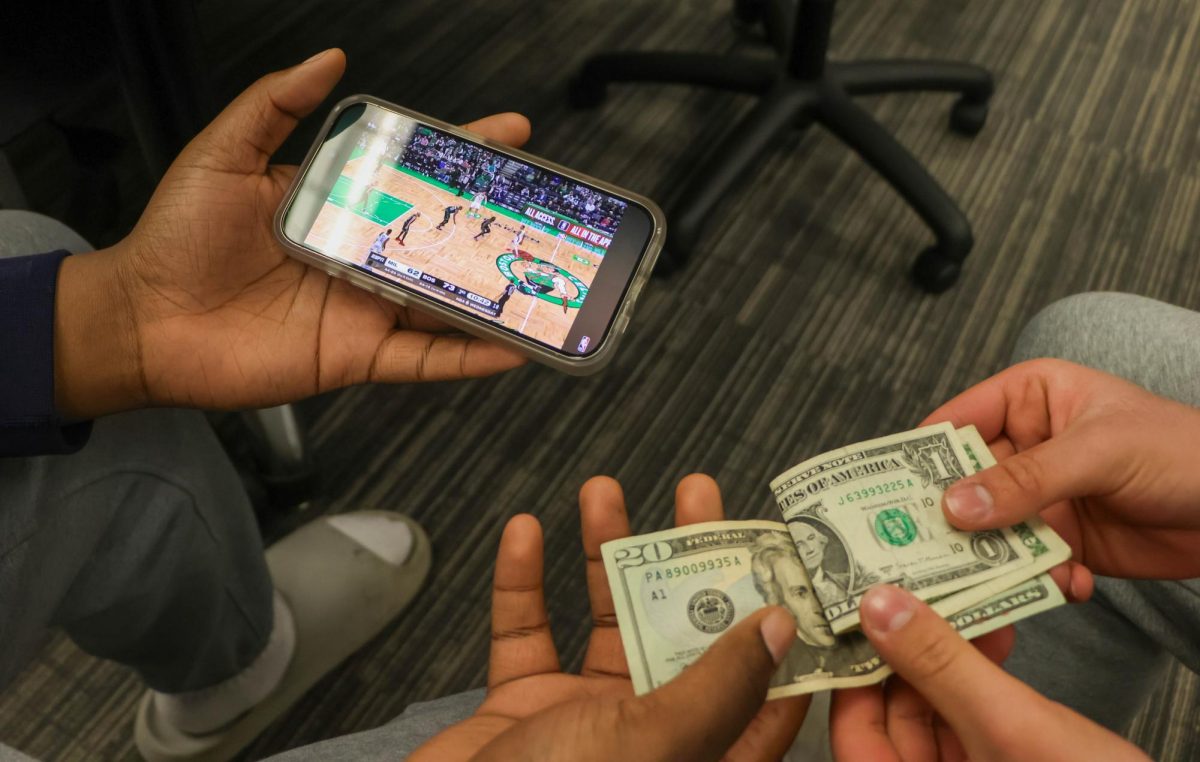Anxiously pulling out his hair, senior Jordan Ouyang loses a blackjack hand while playing during his ELA class. The anticipation was rising, but suddenly he won a hand. Ouyang slams his hands on the table and stands up, victorious. He said he won around $3,000 during class.
Ouyang said in the majority of gambling, the odds are against the player, and winning is extremely rare.
“You’re most likely never going to win, but there are certain ways to prevent [losing] or help you succeed,” Ouyang said.
Valerie Escobar, Senior Wealth Advisor at Mariner Wealth Advisors in Kansas City, said gambling is not limited to money, but can also be done with a variety of valuables, or even being indebted to a favor.
She said gambling can be done responsibly if individuals set restrictions for themselves. She recommends people set aside a small amount of money that is their casino money or betting money. She said losing 100% of this money should not affect the financial life of an individual.
Escobar said gambling is most likely exposed to teenagers by adults and social media, especially when it comes to sports betting.
“I would imagine it’s a lot to do with sort of that mystique involved with what sports brings and what athletes are doing,” Escobar said. “I think it’s just another step toward embracing sort of this cult of sports in general.”
Cory Thone, public information officer at the Kansas Lottery, said sports wagering has only been legal for one fiscal year, Sept. 1 2022 to June 30 2023. During that year, $1.6 billion in bets were made in Kan. with about $1.5 billion paid back in prizes.
Senior Thomas Mitchell said a few of his friends introduced him to sports betting, about nine months ago. He said he first started gambling by betting on the NBA playoffs. Mitchell said he began making money from it, and since he did not have a job at the time, it was his main source of income.
Getting her start with a more traditional form of gambling, senior Danni Waller said that her older brother introduced her to poker and taught her how to play. When Waller first learned to play, both she and her friend got together with her brother and his friends and played poker. Waller said that game was memorable to her, as she and her friend, who were the only girls, ended up winning against everyone else while betting all of their chips.
On the other hand, Ouyang said gambling and betting are something he has done since he was younger. Beginning with simply betting one or two dollars with his parents and messing around, Ouyang said as he got into high school, many of his peers began sports betting or gambling, although he mostly plays blackjack online.
The Express reached out to Ouyang’s parents repeatedly to comment on their son’s gambling habits but received no response.
In the state of Kansas, the legal age for gambling is 21, specifically for sports betting and casino betting. At the age of 18, purchasing lottery tickets and online horse betting, which is placing bets on horse races, is allowed.
Northwest para and assistant boys basketball coach Liam Woulfe, who is above the legal gambling age, said his most memorable sports betting moment was one he experienced with his friends.
“I think the most memorable experience for me was when me and my buddy placed a ten-leg parlay earlier this year on a bunch of random small school basketball teams,” Woulfe said. “We were up on a Wednesday night until 11:30 pm watching Colorado State for the last leg to hit.”
Junior Krrish Sanjanwala said he typically plays games such as poker with only poker chips instead of using money; however, his friends who are over 18 years old will play with money. If he has to play with money, Sanjanwala said his older brother pays for him since he is over 18.
Thone said to prevent underage gambling there are killswitches on Kan. lottery machines. He said employees are directed to use them if they notice suspicious behavior.
Along with this, Randy Evans, law enforcement officer and government relations manager at the Kansas Racing and Gaming Commission said casinos have security, who ask for identification from each person who enters to keep underage individuals out. For sports wagering apps, it is required to scan a picture of a driver’s license, which includes the date of birth and other personal information.
To get around this law, Ouyang said he gambles on a website from Europe and plays blackjack.
“When I bet online when I do want to play [blackjack], I only deposit $100 and sometimes I’ll lose that $100 in 25 minutes, 30 minutes, or [the] $100 will become a return of like 2,000 bucks,” Ouyang said.
Ami Sanjanwala, mother of Sanjanwala said she believes 21 is a fair age for individuals to begin gambling, but said she would not mind if the age was 25 instead. Even though people are legally adults at 21, she believes that they are not mature enough.
Mitchell’s mother, Chanie Mitchell, discussed the gambling age restriction and said she recognizes why the legal gambling age is 21 in Kansas but also believes it could be lowered.
“I understand why they want to keep it at a reasonable age because people do get addicted to gambling, and grown adults lose their livelihood being addicted to gambling,” Chanie said. “But I think if you are old enough to go off to war you should be able to bet.”
Escobar said the thrill of gambling is the most enticing part.
“It’s kind of like this dopamine hit that people get from alcohol or drugs or anytime that somebody is doing something [where] they get an instantaneous reward, like an emotional reward,” Escobar said. “The reward is so great that people continue to go back for it, even though it’s not necessarily going to result in that same reward every single time.”
Sanjanwala said he enjoys the competitive aspect of betting. Throughout his childhood, he said he would make bets with his close friends, typically on low-stake things such as spike ball. He said placing bets would encourage people to try harder and put more effort into whatever they are doing.
Waller’s father, Chris Waller, said gambling, specifically the game of poker, can be beneficial in some aspects.
“I don’t know that if I were sitting there talking to my grandmother that I would be bragging on the fact that I’ve got an 18-year-old senior in high school that’s gambling a little bit, but I do think that particularly the game of poker, develops some mental skills,” Chris said. “I wouldn’t want either of my children to go to be professional poker players, but I think it’s a good thing to do.”
Chris said that poker teaches people how to read others’ expressions and understand their thoughts, which is more important than actually gambling. He described the risk factor of the game as an analogy to life, as risk is an important component of decision-making.
In contrast, Escobar said gambling can often negatively impact people from a financial standpoint. She said financial planning is about understanding the balance of inflows and outflows, meaning they must be predictable. This includes having a stable job, and with the element of gambling, debts increase and income flows are not dependable.
“If you win big and you’re like, ‘Man, I am really good at this and this is the way it’s supposed to be and then I’m supposed to have huge cash inflows all at once,’ that could be your expectation, you know, going forward,” Escobar said. “With a successful financial future, it’s really about being slow and methodical.”
Evans said it is difficult for underage people to understand how challenging it is to win. He said the marketing and advertisements that companies have make gambling seem much simpler to learn. By participating in gambling, people of all ages will be affected financially.
AP Statistics teacher Michele Ratigan said she has caught students gambling during class and strongly disapproves of this practice since all of her students are not of legal age.
“I always tell them, because we do a probability unit in statistics, that there is no way that individuals are winning more than the companies who are providing the gambling opportunities or they wouldn’t be in business,” Ratigan said.
Ouyang admitted he has a problem with gambling, but still finds ways to be, what he considers, responsible while participating in this hobby so he does not go into debt.
“I’ve only really just started gambling and I would say I have a pretty, pretty severe gambling addiction,” Ouyang said. “But I am personally financially literate enough where I know I won’t put myself into a bad situation, but I just know my limits and my boundaries.”
In comparison, Woulfe said he enjoys the experiences sports betting gives him.
“I only bet on college football and basketball,” Woulfe said. “It is more of something that is just fun for me and my buddies to connect on and it is not so much about the money.”
Mitchell said he used to be irresponsible while gambling, but now he can stop gambling and betting whenever he wants to because he does not bet a large sum of money.
“There are times when I lost a lot of money so I had to make some rules for myself, but once I made those rules I started becoming a lot smarter with my money and [now] it more like a fun hobby and not like a job,” Mitchell said.





